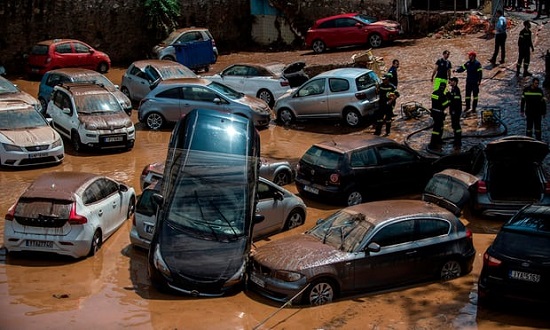
Story of the Week... Toon of the Week... Quote of the Week... Graphic of the Week... SkS in the News... SkS Spotlights... Video of the Week... Coming Soon on SkS... Climate Feedback Reviews... SkS Week in Review... Poster of the Week...
Exclusive: Prof Michael Mann declares the impacts of global warming are now ‘playing out in real-time’

The extreme heatwaves and wildfires wreaking havoc around the globe are “the face of climate change,” one of the world’s leading climate scientists has declared, with the impacts of global warming now “playing out in real time.”
Climate change has long been predicted to increase extreme weather incidents, and scientists are now confident these predictions are coming true. Scientists say the global warming has contributed to the scorching temperatures that have baked the UK and northern Europe for weeks.
The hot spell was made more than twice as likely by climate change, a new analysis found, demonstrating an “unambiguous” link.
Extreme weather has struck across Europe, from the Arctic Circle to Greece, and across the world, from North America to Japan. “This is the face of climate change,” said Prof Michael Mann, at Penn State University, and one the world’s most eminent climate scientists. “We literally would not have seen these extremes in the absence of climate change.”
“The impacts of climate change are no longer subtle,” he told the Guardian. “We are seeing them play out in real time and what is happening this summer is a perfect example of that.”
“We are seeing our predictions come true,” he said. “As a scientist that is reassuring, but as a citizen of planet Earth, it is very distressing to see that as it means we have not taken the necessary action.”
Extreme global weather is 'the face of climate change' says leading scientist by Damian Carrington, Environment, Guardian, July 27, 2018
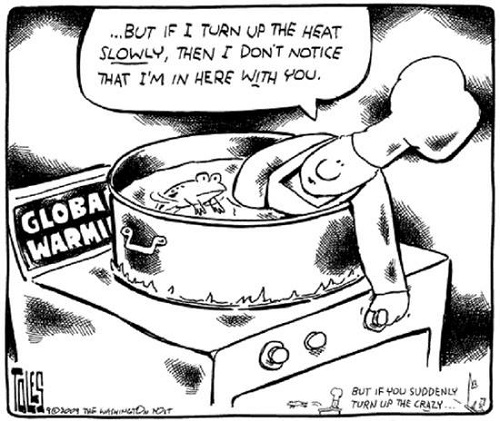
Rising temperatures linked to human-caused climate change could lead to increasing suicide rates in the U.S. and Mexico, a study suggested Monday.
By comparing historical temperature and suicide data going back decades, researchers found a strong correlation between warm weather and increased suicides, according to new research published in Nature Climate Change, a peer-reviewed British journal.
Researchers have known for centuries that conflict and violence tend to peak during warmer months.
"Now we see that in addition to hurting others, some individuals hurt themselves," said Solomon Hsiang, study co-author from the University of California-Berkeley. "It appears that heat profoundly affects the human mind and how we decide to inflict harm."
Global warming risk: Rising temperatures from climate change linked to rise in suicides by Doyle Rice, USA Today, July 23, 2018
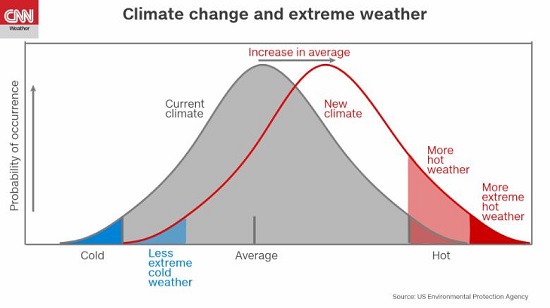
Record-breaking summer marches on to the beat of climate change by Brandon Miller, CNN, July 24, 2018
In her Yale Climate Connections article, Climate change science comeback strategies Karin Kirk wrote:
Strategy #2 – Expose the myth, misinformation, or fallacy
Few may be surprised that most attempts to undermine climate science hinge on some type of misinformation. Cherry-picked data, fake experts, and conspiracy theories are well-worn hallmarks of contrarian rhetoric.
John Cook, founder of Skeptical Science and now a research assistant professor at the Center for Climate Change Communication at George Mason University, has extensive experience unraveling climate denial. Cook’s work has found that a sort of “inoculation” can help with climate misinformation. In other words, if people are exposed to the techniques commonly used in misinformation, they become more resistant to being misled when in the future they encounter bogus information.
So Cook’s response to the example comment is simple. He points directly to the logical fallacy at the heart of the myth, and uses an easy example to illustrate that the statement can’t be correct.

Our mission
We use the power of law to protect people and the planet
Our values
We believe that society’s relationship with the natural world can and must be changed, and that law is an appropriate and effective tool to do so. In delivering our mission, we value:
Agility. The freedom, nimbleness and drive to seize strategic opportunities.
Boldness. The audacity, passion and conviction to challenge the status quo and take risks.
Creativity. The ability to innovate, learn and collaborate to find solutions.
The 5 Big Clite Unkowns by Climat State, July 27, 2018
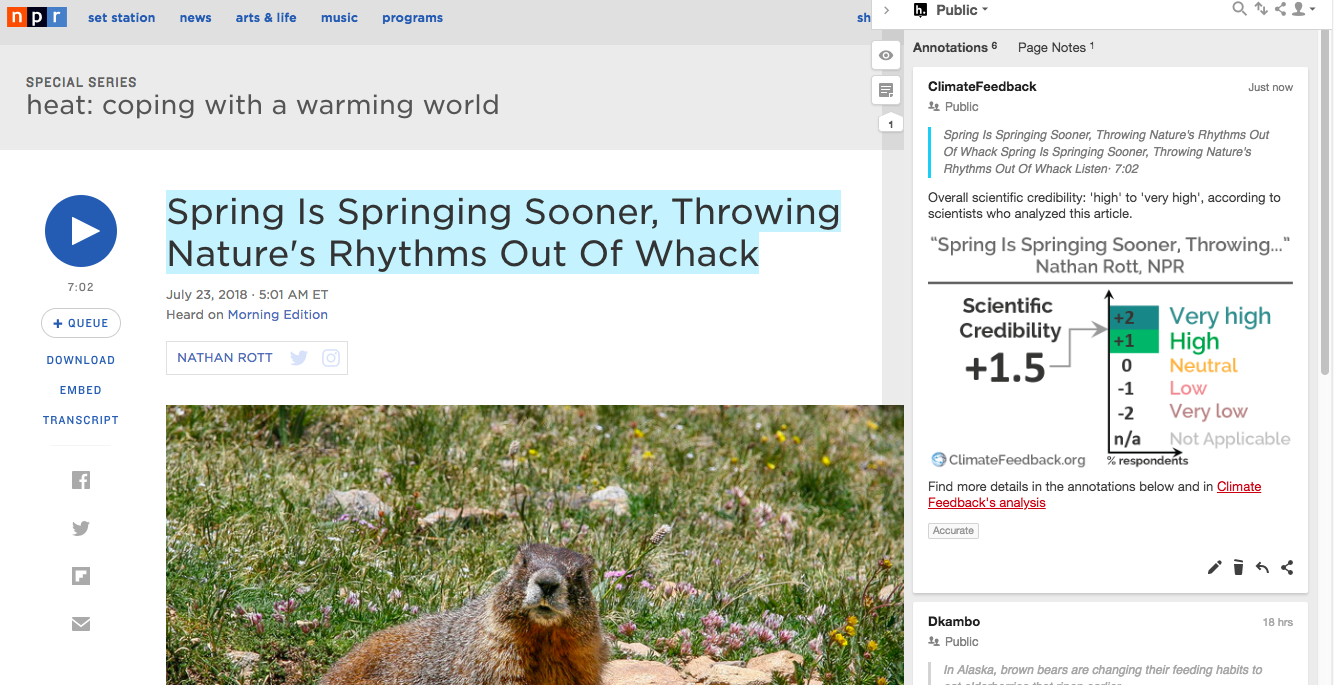
Climate Feedback asked a team of scientists to review the article, Spring Is Springing Sooner, Throwing Nature's Rhythms Out Of Whack by Nathan Rott, NPR, July 23, 2018
Two scientists analyzed the article and estimate its overall scientific credibility to be 'high' to 'very high'.
A majority of reviewers tagged the article as: Accurate.
Review Summary
This article at NPR discusses what happens when warm spring weather arrives earlier because of climate change. Animals must adjust to changes in the timing of plant flowering, for example, leading to noticeable desynchrony in the ecosystem, e.g. “Flowers are blooming before there are bees to pollinate them. Hard frosts are still occurring long after winter’s snow melts away, decimating fruit orchards and budding plants.”
Scientists who reviewed the story found that it accurately represented trends in data and research on the topic. They found only a few statements that could be improved, such as referencing snowpack in April rather than January to better relate to spring conditions.
NPR story accurately describes ecological consequences of altered spring timings in a warming climate, Edited by Scott Johnson, Climate Feedback, July 27, 2018
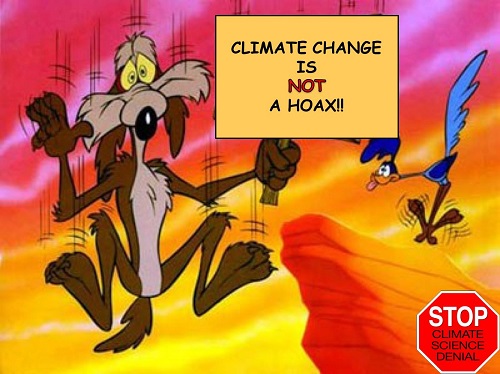
Posted by John Hartz on Sunday, 29 July, 2018
 |
The Skeptical Science website by Skeptical Science is licensed under a Creative Commons Attribution 3.0 Unported License. |